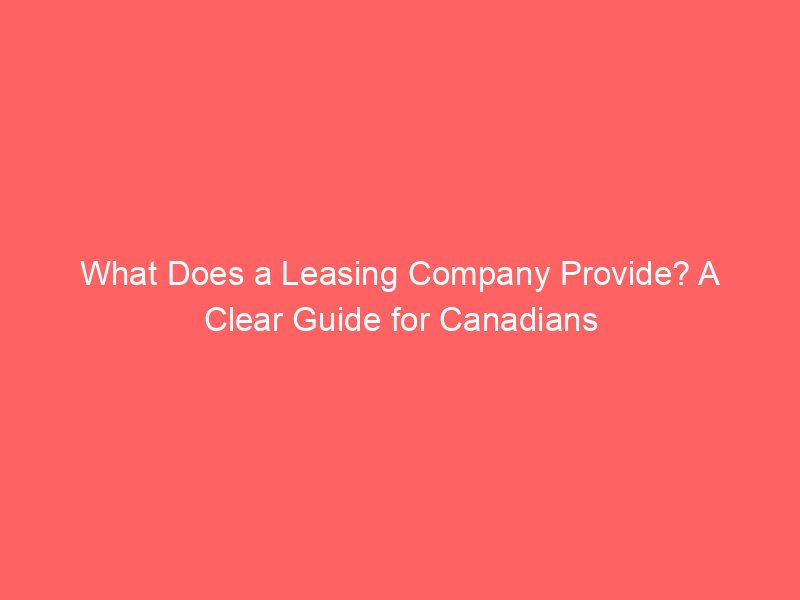A leasing company offers businesses and individuals access to assets through rental agreements, usually for vehicles, equipment, or property. They handle the purchase, maintenance, and financing, allowing clients to use the asset without owning it outright. This setup helps manage cash flow, reduce upfront costs, and keep operations flexible.
Leasing companies play a crucial role in Canada’s economy, especially for small businesses and startups. Instead of tying up capital in expensive equipment or vehicles, companies can lease what they need and focus funds elsewhere. This article breaks down what leasing companies provide, how they operate, and why leasing might be a smart choice.
What Services Do Leasing Companies Offer?
Leasing companies provide several key services that make asset use easier and more affordable:
- Asset Financing: They buy the equipment, vehicles, or property you need and lease it to you. This removes the burden of large upfront payments.
- Maintenance and Repairs: Many leases include maintenance packages, so the leasing company handles servicing and repairs.
- Flexible Terms: Lease durations can vary from months to years, offering options that suit different business cycles.
- End-of-Lease Options: At lease end, you can return the asset, buy it at a residual price, or upgrade to a newer model.
- Tax Benefits: Leasing payments can often be deducted as business expenses, improving tax efficiency.
These services help businesses avoid the risks and costs of ownership while accessing the latest equipment or vehicles.
Why Do Canadians Choose Leasing Companies?
Leasing companies appeal to many Canadians because they reduce financial strain and provide operational flexibility. For example, a construction company might lease heavy machinery for a project instead of buying it. This avoids large loans and keeps cash available for other needs.
Small business owners benefit from predictable monthly payments and lower upfront costs. Leasing also protects against asset depreciation, which can be a headache when owning equipment outright.
Types of Leases Commonly Offered
Leasing companies in Canada typically offer:
- Operating Leases: Short-term, with no ownership transfer. Ideal for assets that depreciate quickly.
- Finance Leases: Longer-term, with an option to buy at lease end. Suitable for businesses wanting eventual ownership.
- Vehicle Leases: Popular for both personal and commercial use, including cars, trucks, and vans.
- Equipment Leases: For machinery, computers, medical devices, and other business tools.
- Real Estate Leases: Leasing commercial or industrial property without buying.
Each lease type suits different needs, budgets, and business strategies.
How Does the Leasing Process Work?
The leasing process is straightforward but involves several important steps:
- Needs Assessment: The leasing company evaluates what asset you need and your financial situation.
- Lease Proposal: They offer terms including monthly payments, lease length, and maintenance options.
- Approval: Credit checks and documentation are completed.
- Asset Delivery: The company purchases and delivers the asset to you.
- Lease Management: You make regular payments and follow lease terms.
- End of Lease: You decide to return, renew, or buy the asset.
This process minimizes hassle and speeds up access to necessary assets.
What Are the Costs Involved?
Leasing costs vary based on asset type, lease length, and included services. Typically, you’ll pay:
- Monthly Lease Payments: Covering depreciation and financing costs.
- Maintenance Fees: If included in the lease.
- Insurance: Often required for leased vehicles or equipment.
- End-of-Lease Charges: For excess wear or mileage.
Leasing companies provide clear cost breakdowns upfront, so you avoid surprises.
Benefits of Leasing Over Buying
Leasing offers several advantages for Canadian businesses and individuals:
- Lower Initial Expense: No large capital outlay.
- Cash Flow Management: Predictable monthly payments.
- Access to Newer Assets: Easier upgrades at lease end.
- Off-Balance Sheet Financing: Leasing may not appear as debt.
- Tax Advantages: Lease payments often deductible.
These benefits make leasing a practical choice for many.
What Should You Look for in a Leasing Company?
Choosing the right leasing company matters. Look for:
- Transparent Terms: Clear contracts without hidden fees.
- Reputation: Positive reviews and solid track record.
- Customer Service: Responsive support during lease.
- Asset Variety: Options that fit your needs.
- Flexible End-of-Lease Options: Buy, return, or renew.
Doing your homework ensures a smooth leasing experience.
Canadian Market Insights and Data
According to the Canadian Finance and Leasing Association (CFLA), the equipment leasing market in Canada grew steadily over the past decade, with over $50 billion in assets leased annually. Small and medium-sized enterprises (SMEs) make up the largest segment of leasing clients, accounting for nearly 70% of leases.
Vehicle leasing is also popular, with approximately 30% of new vehicles in Canada leased rather than purchased outright. This trend reflects the appeal of predictable costs and the ability to upgrade vehicles regularly.
Including an infographic here showing the breakdown of leased assets by industry and type would help readers visualize the market.
Common Misconceptions About Leasing
Many Canadians think leasing means higher long-term costs or loss of ownership benefits. While leasing may cost more over many years, it offers flexibility and less risk. Ownership isn’t always the best financial move, especially if assets depreciate fast or become obsolete.
Another myth is that leasing is only for large companies. In reality, many small businesses and even individuals lease vehicles and equipment to manage budgets better.
Leasing Company vs. Traditional Loans
Leasing companies differ from banks or lenders. Loans require upfront cash or collateral and transfer ownership immediately. Leasing spreads costs over time without ownership until you decide to buy.
This difference matters for businesses needing to preserve capital or avoid debt on their balance sheets.
Final Thoughts
Leasing companies provide a practical solution for Canadians needing vehicles, equipment, or property without the burden of ownership. They offer financing, maintenance, and flexible terms tailored to diverse needs.
Whether you’re a small business owner or an individual, leasing can free up cash, reduce risk, and keep your operations nimble. Understanding what leasing companies provide helps you make informed decisions about managing assets.
